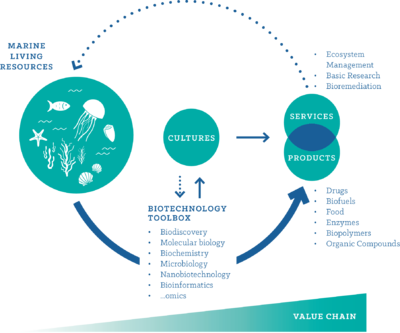Portal:Marine Biotechnology
Marine Biotechnology
Marine biotechnology explores and uses marine bioresources as the target for or origin of technological applications, which are used for the production of products and services.

|
| Examples of products and services developed by technological applications using marine bioresources (diagram adapted from the European Marine Board Position Paper [1]). |
In the context of a global economic downturn, we are now facing complex and difficult challenges such as the sustainable supply of food and energy, climate change and environmental degradation, human health and ageing populations. Yet concurrently, the seas represent one of the most abundant sources of food and energy production on the planet, as well as containing the potential for countless innovations in drug production, industrial process development, ecosystem management and other related fields. Marine Biotechnology can make an increasingly important contribution towards meeting these societal challenges and supporting economic recovery and growth, by delivering new knowledge, products and services.
Estimates predict an annual growth in the sector of up to 10-12% in the coming years, revealing the huge potential and high expectations for further development of the Marine Biotechnology sector at a global scale.[1]
References
Main Research Areas
Developments in life science technologies are one of the key drivers of Marine Biotechnology research. Previous advances in molecular biology, genomics and -omics have contributed to Marine Biotechnology developments.
There are further challenges in developing and optimising an appropriate biotechnology toolbox for innovations using marine bioresources. These include tailored -omics techniques, in situ measurement, sampling and monitoring, improvements in the cultivation of microorganisms and the use of marine model organisms. An improved and well-adapted toolbox is expected to have a large impact on future progress in marine biotechnology.
The target research and innovation areas that can address key societal challenges are listed below:
| Food: Development of food products and ingredients of marine origin (algae, invertebrates, fish) with optimal nutritional properties for human health and with improved food security and safety prospects. | |
| Energy: Development and demonstration of viable renewable energy products and processes, notably through the use of marine algae including seaweeds and microalgae. | |
| Human Health: Discovery of new molecules and development of novel medicines, nutraceuticals and personal care products. | |
| Industrial Products and Processes: Development of marine-derived molecules that can be used to establish green and new processes, including enzymes, biopolymers and biomaterials, and that can replace petrochemical products. | |
| Environmental Health: Development of biotechnological approaches, mechanisms and applications to address key environmental issues including bioremediation, enhancement of waste water and integrated aquaculture systems that minimize the environmental impact of fish and shellfish farming. |
Content
| What is Marine Biotechnology? |
| Legal Frameworks |
| Glossary |
Purpose
This portal is developed in the FP7 Coordination and Support Action on Marine Biotechnology, CSA MARINEBIOTECH (October 2011-March 2013) and updated by the Marine Biotechnology ERA-NET (December 2013 - November 2017).
This portal is available for
- a broad public, to show the growing importance of the application of biological marine knowledge and cutting-edge techniques to develop products and other benefits for humans;
- researchers, to show outlined priorities for Marine Biotechnology contributions to key societal challenges and examples of case studies showing progress in these fields;
- the industry with interests in marine biotechnology and its outputs, to provide the context in which marine biotechnology innovation might take place;
- policy makers, to provide a discussion and clarification of national strategy documents on marine biotechnology;
- national funding agencies in Europe, to provide important information and insight in scoping and preparing for a future ERA-NET in marine biotechnology;
- other technology platforms and coordination activities dedicated to marine biotechnology, to highlight opportunities for interlinkage and collaboration.





